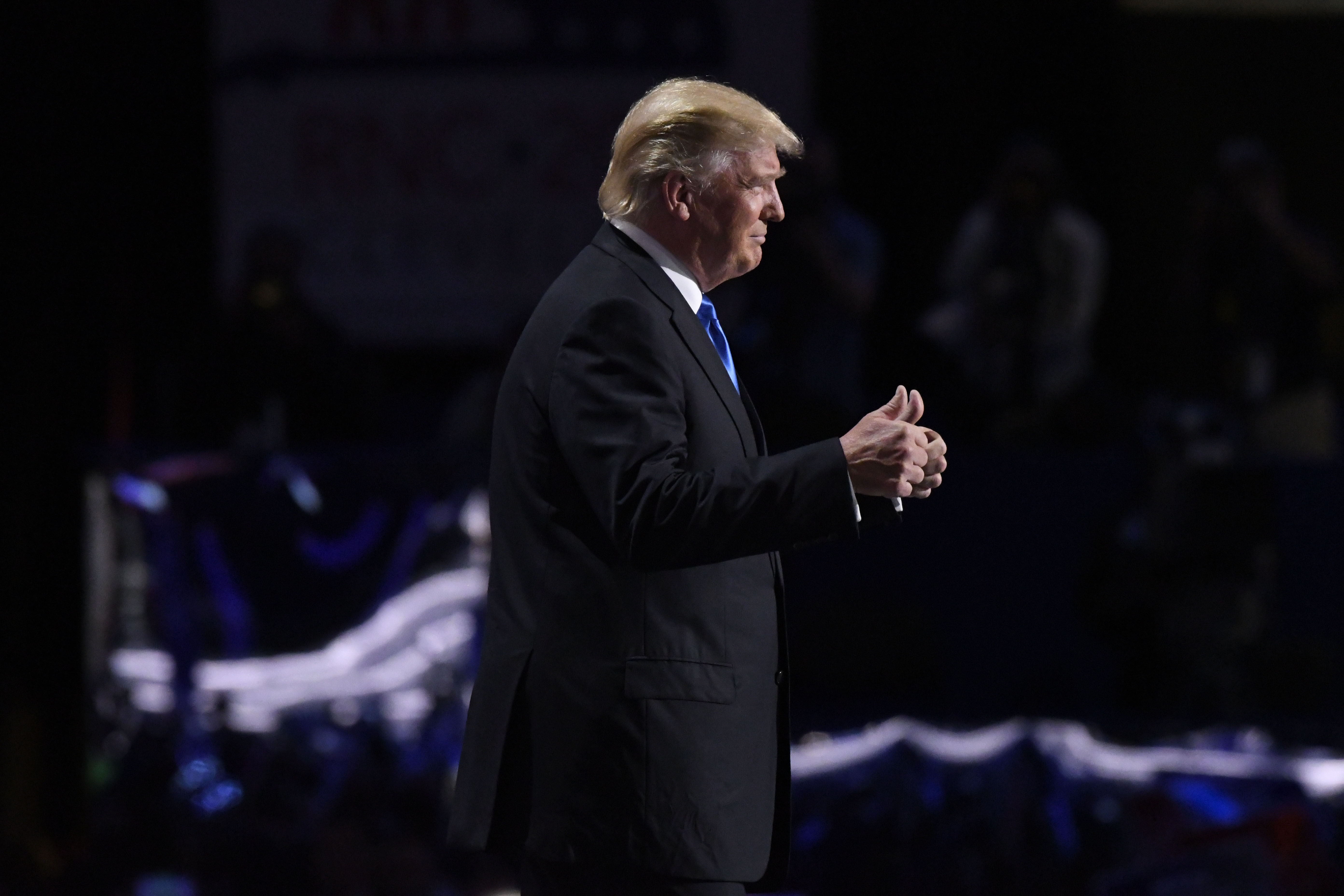CLEVELAND — They backed other candidates in the Republican primaries, or stayed out altogether. They have had to defend or distance themselves from his most provocative declarations. In public and private, they've urged him to exercise more discipline and restraint.
![USP NEWS: REPUBLICAN NATIONAL CONVENTION A ELN USA OH [image : 87314424]](http://www.gannett-cdn.com/media/2016/07/19/USATODAY/USATODAY/636045488934319056-USP-News--Republican-National-Convention.7.jpg)
![Here's what you missed on Day 2 of the RNC [video : 87328456]](http://videos.usatoday.net/Brightcove2/29906170001/2016/07/29906170001_5042407390001_day-2-thumb.jpg?pubId=29906170001)
But there is no denying that Donald Trump became the face of the GOP on Tuesday night with his formal nomination at the Republican National Convention. Now the nation's highest-ranking elected officials and party leaders have little choice but to embrace him, however gingerly.
Republican National Chairman Reince Priebus, House Speaker Paul Ryan, Senate Majority Leader Mitch McConnell and others in speeches from the convention floor Tuesday and conversations with reporters are careful not only to back Trump but also to make it clear they differ with him on some policies and tactics. Left unspoken: a fear by some that he is likely to lose in November with consequences that could be damaging, even catastrophic, for the GOP down the road.
![Latest from #RNCinCLE: Ryan pleads for unity [oembed : 87325656] [oembed : 87325656] [oembed : 87325656] [oembed : 87325656] [oembed : 87325656] [oembed : 87325656] [oembed : 87325656] [oembed : 87325656]](/Portals/_default/Skins/PrestoLegacy/CommonCss/images/smartembed.png)
![GOP delegates make it official: Trump's their choice [oembed : 87325646] [oembed : 87325646] [oembed : 87325646] [oembed : 87325646] [oembed : 87325646] [oembed : 87325646] [oembed : 87325646] [oembed : 87325646]](/Portals/_default/Skins/PrestoLegacy/CommonCss/images/smartembed.png)
"He’s not my kind of conservative, but I come from a different part of the wing of the party," Ryan told reporters Monday at a luncheon hosted by The Wall Street Journal. He said the Republican Party could include both him and Trump because "we're a big-tent party," adding to laughter, "This is a big tent, real big, bigger than it used to be," stretching his arms wide.
When McConnell rose to address the convention hall Tuesday night, he focused more on why voters should oppose Democrat Hillary Clinton than why they should support Trump. The Kentucky senator in his prepared text mentioned Clinton's name 13 times, Trump's name just five.
And in his address, Ryan mentioned Trump's name just twice, instead presenting an indictment of "broken promises" by Democrats and a defense of free-market Republican ideology. "Let’s take the fight to our opponents with better ideas," he declared, concluding with an oddly impersonal endorsement of the nominee: "Let's see it through. Let's win this thing."
After Republican Mitt Romney lost the 2012 election, Priebus commissioned an "autopsy" that concluded it was imperative for the GOP to build its support among the nation's increasingly diverse electorate. It recommended new approaches on issues from immigration to gay rights that Trump, and the party platform passed Monday, largely ignored.
The party chairman is still pressing the point, though.
![USP NEWS: REPUBLICAN NATIONAL CONVENTION A ELN USA OH [image : 87314558]](http://www.gannett-cdn.com/-mm-/21c6407ae87884cbee9407d8ea848590ad16cb17/c=551-0-4440-3324/local/-/media/2016/07/19/USATODAY/USATODAY/636045489843180882-USP-News--Republican-National-Convention.8.jpg)
"It's important that we get out and talk to Hispanic voters across the country and start dealing with that issue," Priebus said at a breakfast with reporters Tuesday hosted by Bloomberg Politics. "I don't think we can win without appealing to Hispanic, black and Asian voters across the country."
What Trump has succeeded in doing already is drawing some new voters to the GOP, among them white men, especially those who don't have a college education. But that's come at a cost of support among college-educated whites and others.
The candidate who launched his campaign with an attack on Mexican immigrants as rapists and murderers has an even lower standing with Latinos than Romney, who received just 27% of the Hispanic vote. Earlier this month, he got zero support from African Americans in Ohio and Pennsylvania, according to NBC News/Wall Street Journal/Marist statewide polls.
![Day 2 of the 2016 Republican National Convention [videoplaylist : 87282688]](http://videos.usatoday.net/Brightcove2/29906170001/2016/07/29906170001_5042385451001_ryan-thumb.jpg?pubId=29906170001)
![#TrumpNation: Supporters see themselves in Republican nominee [oembed : 87314662] [oembed : 87314662] [oembed : 87314662] [oembed : 87314662] [oembed : 87314662] [oembed : 87314662] [oembed : 87314662] [oembed : 87314662] [oembed : 87314662] [oembed : 87314662] [oembed : 87314662] [oembed : 87314662] [oembed : 87314662] [oembed : 87314662] [oembed : 87314662] [oembed : 87314662] [oembed : 87314662] [oembed : 87314662] [oembed : 87314662] [oembed : 87314662] [oembed : 87314662]](/Portals/_default/Skins/PrestoLegacy/CommonCss/images/smartembed.png)
McConnell in the past has expressed concern that Trump's rhetoric and his signature promise to "build a wall" along the southern border could solidify the GOP's shortfall with Latinos for a generation. In a particularly dire prediction, Politico, quoting unnamed sources, says former president George W. Bush told a staff reunion in April that he was "worried that I will be the last Republican president.”
It is Donald Trump's party now, says Paul Manafort, the top staffer in his campaign.
"At the end of the day, the platform is Trump's platform," Manafort told a Bloomberg breakfast. "He has changed the face of the Republican Party," likening it to Ronald Reagan's rise in 1980, which turned the GOP in a more conservative direction. "I believe that the situation is similar here — where if Trump is elected president, the transformation that's begun here will be complete."
And if Trump isn't elected president? That's the tougher question for the GOP.


![Tuesday at the Republican National Convention in Cleveland [gallery : 87287102]](http://www.gannett-cdn.com/-mm-/f3f59cd03cdbbfc2e62fd65bb2066ecb9c2f6788/c=2680-1648-3988-2766/local/-/media/2016/07/19/USATODAY/USATODAY/636045451207833653-XXX-jmg-33162.JPG)
